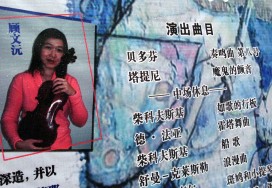

When people ask what I do for a living, I normally say that I teach at the University of Utah. That’s a simplification of my actual job description, but it’s usually about as much as the person asking really wants to know. This usual answer falls short, though, when it comes to explaining a sabbatical. If I’m not in front of students at Utah, what am I doing in Beijing? Teaching Chinese students? Well, no...
Teaching courses is only about half of my job. The other half is “research,” which is not necessarily well defined. There are some typical activities associated with research, such as publishing books and papers, but the trick is to have something to write about. My research is in software, and I arrive at topics by producing a lot of software myself. Then, I write about software development tools and techniques that (in my opinion) work better than current practice, and that should be incorporated into future programming tools and practice.
This sabbatical for me means concentrating on the research half of my job. So, I continue to produce software and write about my conclusions, though from Beijing instead of Utah. At the same time, living somewhere else for a year means that I meet new people and encounter new ideas to help me stay creative. Hopefully, I can also give some new ideas to others.
Wen’s sabbatical is easier to explain. She plays for the Utah Symphony, so, like me, she’s not doing the most visible part of her job while on sabbatical. Instead, she’s practicing a lot—much more than she’s had time for in years. She’s also learning new things about Chinese music, and she has given a couple of recitals here, including one at Peking University at the beginning of June.
 |  |
We chose to spend our sabbatical in China for family reasons. Within China, we chose Beijing because it is the intellectual capital of China. Our neighborhood includes Peking University and Tsinghua University, which are the two most prestigious universities in China. It also includes many institutes of the Chinese Academy of Science, as well as the main Chinese operations of Microsoft and Google.
I’m officially visiting the Lab for Computer Science in the Institute of Software, Chinese Academy of Sciences. (Wen is on her own, work-wise, but since she attended the music conservatory in Beijing, she has many music friends and contacts around town.) My host is Huimin Lin. During my visit, the insititute moved into an impressive new building.
Everyone in the institute speaks English, and visitors to the institute usually give presentations in English. The main working language of the lab is Chinese, though, and while my Chinese is functional on the streets of Beijing or at a dinner party, it’s not good enough to be useful in a work setting. So, I miss out on some things, and language has been more of an obstacle to collaboration and developing contacts than I had anticipated. But we did work together; in particular, Gang Yu and I found a common interest that lead to new research and a joint publication.
I anticipated one other obstacle: the distance between my research area, which is in programming languages, and the research that’s currently active in China. Even research in the institute is not quite in the same area as mine (i.e., we don’t attend the same conferences), but it’s as close as any in China.
It’s not clear to me why China currently lacks research closer to my area. One answer that many would give, especially my Chinese friends, is that programming-language research isn’t practical enough. For example, I imagine that my work might influence mainstream practice 10 to 20 years from now. In China, however, there’s very much a sense that right now is what matters. Still, that explanation doesn’t explain why my colleagues at the institute work on topics that are more theoretical than mine (i.e., things that are even further from immediate application). It may be that the Chinese system can deal with mathematical research (which has a long academic history) and immediate practical work (which has obvious immediate value), while most programming-language research is somewhere in between.
Whatever the reason for the current situation, the safe bet with China is always that the situation will change, and sooner rather than later. I’ll continue trying to be part of the change.| Prev: Winter and New Year | Contents: A Year in China: 2006-2007 | Next: Bonus Material |